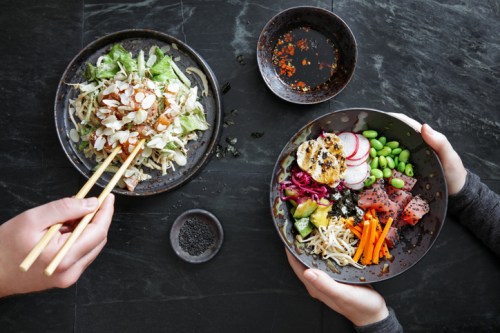Our editors independently select these products. Making a purchase through our links may earn Well+Good a commission
Many people don’t think about integrating folate or folic acid into their diet until they’re trying to get pregnant, which is an unfortunate oversight. In fact, a new scientific study just further affirmed the fact that folate is an important nutrient and key to maintaining optimal health at all phases of life. Here’s what you should know about the importance of eating folate-rich foods daily.
Experts in This Article
Amy Cameron O’Rourke (MPH, CMC) is a dedicated care manager with a passion for helping people & their loved ones find peace and joy as they age. Amy is the author of The Fragile Years and founder of O’Rourke & Associates and The Cameron Group (sold in 2019, now Arosa). She believes our elder years can provide a beautiful opportunity for connection, meaning, and joy.
Amy has over 40 years of experience, including 20 years operating The Cameron Group (care management company), as well as a Master’s Degree in Public Health and a Master’s Certificate in Gerontology. A Licensed Nursing Home Administrator and Certified Care Manager, she is currently the Director of Care Management at Arosa.
Lauren Hubert MS, RD is the Registered Dietitian and Weight Loss Expert behind The Sorority Nutritionist.
registered dietitian and prenatal and postnatal health expert
registered dietitian and co-founder of The Nutrition Twins
registered dietitian and co-founder of The Nutrition Twins
What is folate, and what is the difference between folate vs. folic acid?
Before we jump into the new research, let’s define what folate is and clear up a common misconception: that folate and folic acid are the same thing. Folate is a B-vitamin (vitamin B9 to be exact) that is naturally found in food. It’s needed to make DNA and other genetic material and is key for helping cells divide. It also helps a baby’s brain, skull, and spinal cord develop properly, which is why folate is so closely associated with the conception and pregnancy periods. On the other hand, folic acid is the synthetic version found in supplements and fortified foods. It’s important to note that folate is not made by the body, which makes it an essential nutrient that we must get from outside sources, meaning foods rich in folate.
Whether you’re consuming folate or folic acid, in order to reap these benefits, the nutrient will need to be converted into an active form. This process is far more likely to happen when you are getting the vitamin naturally from folate foods versus folic acid supplements. “This is because folate is converted into its active form in the digestive system before entering the bloodstream. With folic acid, however, not all of it is converted in the digestive system,” explains Lyssie Lakatos, RDN, CDN, CFT and Tammy Lakatos, RDN, CDN, CFT, The Nutrition Twins and founders of 21-Day Body Reboot. “Instead, some needs to be converted in the liver and in other tissues, which is not an efficient process. Unmetabolized folic acid can sit in the bloodstream for a long time and it can’t be utilized, which has been associated with a number of health problems.”
The new research findings on folate deficiency
Now, there is one more key reason to zone in on folate. A new study published in Frontiers in Neuroscience—a systematic review and meta-analysis of the association between folate and Alzheimer’s Disease—found that there is evidence to show that the vitamin plays an important role in the development of Alzheimer’s Disease. This is critical because Alzheimer’s is, today, the most common type of neurodegenerative disease leading to dementia in the elderly.
Around 60 publications were included in the review, each of which had a sample size ranging from 24 to 965, to comprehensively evaluate the associations between Alzheimer’s and folate levels. The results showed that the folate level of Alzheimer’s patients was lower compared with that of the healthy controls. Therefore, researchers concluded that there’s plausible reason to think that a deficiency of folate increases the risk for Alzheimer’s and, arguably more importantly, sufficient daily intake of folate could reduce the risk of Alzheimer’s.
“From the information in this study and considering the other known benefits of folate for our body and brain, it is encouraged to have sufficient daily intake of folate to reduce risk of Alzheimer’s,” says Lauren Hubert, MS, RD.
Amy Cameron O’Rourke, MPH, CMC, an advocate for senior care in the U.S. and the author of The Fragile Years echoes this. “I have been a long time believer in a deficient diet being a risk factor for many medical diagnoses and Alzheimer’s is no exception. Folate aids in the growth of healthy cells, so it isn’t difficult to make the leap to see proper folate as a protective factor for Alzheimer’s.” O’Rourke goes on to say that exercise, along with being socially engaged and following an anti-inflammatory diet (or a diet with less processed food), are some other effective ways to prevent Alzheimer’s.
The recommended daily amount of folate for adults is 400 micrograms (mcg). For those who are pregnant, it is about 600 -1000 mcg. “If a person is eating a balanced diet, they are likely getting enough folate,” says Lauren Manaker, MS, RDN, LD, a registered dietitian for Zhou Nutrition. She goes on to advise that women of childbearing age consider taking a supplement and eating fortified foods to make sure they’re reducing the risk of developing certain birth defects should they become pregnant. In general, however, she affirms that supplements are a supplement to a healthy diet.
“It’s also important to note that like anything in life, you can consume too much folate and that can have other impacts on the body,” says Hubert. “For most people, you don’t need folic acid supplementation and should instead focus on getting folate through natural food sources in your diet.” Luckily there are many non-processed, anti-inflammatory foods that contain folate. Here’s a look at five of the best, according to The Nutrition Twins.
The top 5 folate foods
1. Edamame
“One-half cup cooked edamame has 241 mcg folate, or 60 percent of the daily requirement. It makes a delicious snack or appetizer that provides a prolonged energy boost thanks to the combination of fiber and protein, which help to keep blood sugar stable. You can toss edamame beans on salads, too.”
2. Lentils
“One-half cup of cooked lentils has 179 mcg of folate—almost half of the daily requirement. Lentils are a great source of protein and fiber and are a super satisfying source of plant protein. They’re wonderful to add to the diet as their fiber helps to keep you regular and improve gut health. They’re also a great source of iron, which is particularly good for vegetarians who often struggle to get enough. They make a great substitution for meat in tacos, salads, and soups.”
3. Asparagus
“One-half cup asparagus has 164 mcg, or 40 percent of the daily requirement. It’s also rich in fiber, and is a great source of anthocyanins—these antioxidants help protect the body from the damage caused by free radicals, which can lead to chronic disease. Another fun reason to add it to the diet: asparagus contain the amino acid asparagine, which acts as a natural diuretic, helping to flush excess fluid and salt from your body.”
4. Spinach
“A half cup of steamed spinach provides 131 mcg of folate, which is around one third of the daily 400 mcg requirement. It promotes immune and skin health since it’s rich in vitamin C. Spinach is also great for vegetarians and vegans since it’s a rich source of iron and calcium, two nutrients that most people associate with animal products.”
5. Black Beans
“One half cup serving of black beans contains 128 mcg of folate, roughly a third of the daily requirement. Add beans to your salad, make bean soup, chili, burrito, bean salsa, or a casserole and you’ll also get a hefty dose of fiber, antioxidants, plus protein.”
You can also try adding black beans to your dessert with this delicious black bean brownie recipe:
Oh hi! You look like someone who loves free workouts, discounts for cutting-edge wellness brands, and exclusive Well+Good content. Sign up for Well+, our online community of wellness insiders, and unlock your rewards instantly.
Sign Up for Our Daily Newsletter
Get all the latest in wellness, trends, food, fitness, beauty, and more delivered right to your inbox.
Got it, you've been added to our email list.











